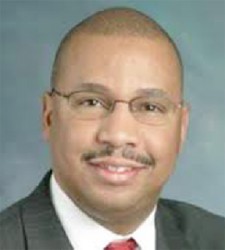The vulnerability of small, fragile Caribbean economies to money laundering associated with narcotics and the laundering of illegally gotten funds makes it imperative that their governments ensure strict adherence to anti-money laundering measures and international benchmarks, a former United States banking regulator has said.
Ahead of what is regarded as the important 34th Annual Crime Stoppers International Conference scheduled for the Hilton, Barbados

on October 2, International Financial Consultant Frederick Curry made a statement to this effect.
Curry, who also heads the Forensic & Dispute Services practice of the Washington-based Deloitte Financial Advisory Services said that countries that fail to exhibit strong money-laundering controls and the will to prosecute for financial crimes could compromise their economic growth on account of foreign investors being prevented from channeling investments into those countries that did not exhibit strong money laundering controls and the will to prosecute financial crimes. Domestic political controversy has stymied the amending of Guyana’s Anti-Money Laundering and Combating Financing of Terrorism laws, resulting in the embarrassing missing of a deadline set by the Caribbean Financial Action Task Force (CFATF).
The government here has been under sustained pressure from the regional body to act on the recommendations of evaluators regarding what are held to be considerable deficiencies in the country’s anti-money laundering laws, a circumstance that has necessitated meetings between local government officials and CFATF functionaries.
Curry is quoted as saying that delegates to the October 2 meeting can anticipate strong messages asserting that a coordinated effort between robust financial institutions and law enforcement organizations committed to prosecuting such crimes was critical to combating money-laundering in the Caribbean. Curry is also of the view that robust anti money-laundering programmes should be built around four pillars, namely, the appointment of a designated anti money-laundering officer to monitor, coordinate and report financial crimes; implementing a well-defined comprehensive anti-money-laundering programme with written policies, procedures and controls; ongoing role-based training and education for employees to ensure they recognize what should be red-flagged and rigorous independent testing of the programme to ensure it is being implemented effectively.





